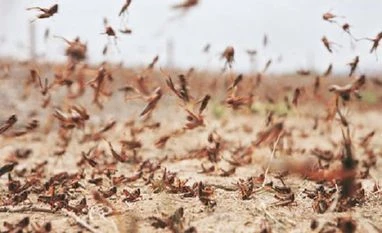Pakistan, India, Iran and Afghanistan will on March 11 chalk out a strategy to deal with the worst locust invasion to hit the region in nearly three decades, according to a media report on Monday.
According to scientists, the recent locust outbreak along the India-Pakistan border may have been driven by the longer-than-usual monsoon rains across the region, and frequent cyclones in the Indian Ocean.
The agriculture ministers of Pakistan, India, Iran and Afghanistan will connect via video-conferencing on March 11 to chalk out a strategy to deal with invasion.
Representatives of the UN's Food and Agriculture Organisation (FAO) will also participate in the meeting via a video link from Abu Dhabi, The Express Tribune reported.
According to the Food and Agriculture Organisation, locusts are the oldest migratory pests in the world.
The locusts, which are considered to be among the most dangerous pests known to humanity, reproduce fast -- 20-fold within three months. An adult locust can eat quantity equal to its weight daily, and just a single square kilometer of swarm can contain up to 80 million adults, they said.
)